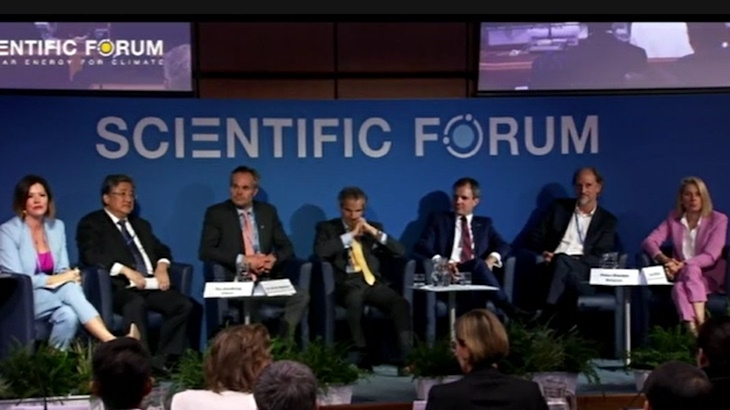
The world saw many changes during the 15 years it took to build and bring into operation Olkiluoto 3, including Fuukshima and regulation changes, Finland's Minister of Climate and the Environment Kai Mykkänen said, with the first EPR to come into service in Europe benefitting from "hundreds" of innovations. But the presence of Europe's largest nuclear reactor on the Finnish grid - it entered commercial operation earlier this year - is the key reason Finland has been able to shut down imports of electricity and gas from Russia, he said. At the same time, the country's spot and future electricity prices are lower than they have been in recent years, he added.
But more innovation is needed, he said. "I'm quite sure that within next 10 years we will see larger amount of nuclear innovation coming to the market … including of course small modular reactors but also when it comes to larger, more traditional reactor types," he said. Finland's investment in nuclear research and development has built on decades of experience developing and using nuclear, but now there is "a clear, new inspiration" for still further investment in innovation.
The UK is another country where EPR units are currently under construction, with an "ambitious" target of 24 GWe of nuclear on the grid by 2050, UK Minister for Nuclear and Networks Andrew Bowie said. The "absolutely clear" message emanating from the forum - and the wider general conference - is that there can be no net-zero without nuclear power, he said. "But it's not just about net-zero - vital as it is to decarbonise baseload," he said. "It's also about affordable energy, being energy secure, and energy independent … If we can work together as like-minded nations developing the technology, supporting the innovation, supporting the research and development … then we can drive down carbon emissions and make energy cheaper and more accessible for more people across the world."
China National Nuclear Corporation Chairman Yu Jianfeng agreed that the pace of innovation - and the pace of new technologies coming on to the market - has been an important player in the rapid growth of nuclear in China. The design of the Hualong One third-generation reactor and rapid development of small modular reactor (SMR) technology is a reflection of the many thousands of nuclear experts engaged in China's nuclear sector, as well as a large network of research institutes, that work as an integrated team. In addition, China has been continuously constructing nuclear power plants since the 1990s, standing it in good stead to meet its future ambitious construction plans.
Innovating outside the box
Peter Baeten, Director-General of the Belgian Nuclear Research Center SCK CEN, underlined the importance of human capital in reaching innovative solutions for challenges such as extending reactor lifetimes and also in securing societal acceptance for the growth of nuclear. While solutions, especially those at the back-end of the fuel cycle need, to be accepted by society and innovation in public interaction, as well as technological innovation, will be important for reaching such acceptance, he said.
Nuclear has embraced innovation for over five decades, World Nuclear Association Director General Sama Bilbao y Léon said, so the industry already recognises that research is an absolute essential, with collaboration between research institutes and industry, and between international organisations, enabling continuous improvement and bringing developments to fruition.
But while technological innovation is absolutely essential for moving the industry forward, there are other aspects of innovation that should not be overlooked, she said. "For example, innovation in the way in which we finance new nuclear - we really need to think outside the box to attract affordable investment. We need to be innovative in the way we license and regulate these reactors," she said, adding that "we need to make the most and optimise" regulatory work to accelerate licensing at global level.
"Nuclear electricity is only one of the products that nuclear power plants can produce. We need to rethink our business model" to factor in the many ways in which nuclear power plants can be used, she said. "And maybe we as an industry need to innovate in the way we inspire, and attract, the next generation of nuclear talent."
Optimism
Asked by session moderator Hannah Vaughan Jones about the speed and scale of innovations, IAEA Director General Rafael Grossi said there will never be a "one-size-fits-all" solution in the energy area but said he is "optimistic" that the world is moving decisively. "One very important corollary is that we can see how nuclear is firmly - very firmly - positioned in this global effort that is taking place right now," he said.
He called for a "larger table" where industry, politicians, decision-makers, regulators, scientists who are advancing innovative techniques can come together to discuss "what needs to be done", he said. This is going to become even more important as nuclear moves into other spheres such as marine propulsion, and process heat supply, and even the integration of fusion power."
"My hope is that this scientific forum will have helped us in getting a clear view of where we are going, what is being done, what is needed. And the effort will continue," he said.
The forum, which took place from 26-27 September, is the flagship side event of the IAEA General Conference. This year's forum - Nuclear Innovations for Net Zero - focused on nuclear innovations for net-zero, and saw leading experts from around the world look at the role of new nuclear reactors for energy production; the importance of innovations such as artificial intelligence, digitalization, robotics and advanced manufacturing in supporting nuclear development; and the use of nuclear technology to avoid greenhouse gases in industrial applications and other areas.